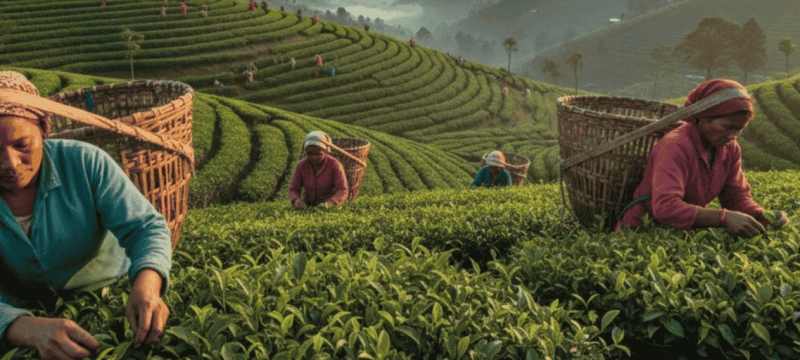Heavy rains in India’s Darjeeling region have caused deadly landslides and floods, severely affecting the area’s famed tea industry. Officials reported that around five percent of Darjeeling tea estates were destroyed, dealing a significant blow to local growers.
Rajkumar Mondal, chairman of the Indian Tea Association’s Dooars Chapter, said more than 950 hectares of plantations suffered major losses due to flooding. Darjeeling, renowned for high-quality teas with a protected Geographical Indication, produces roughly 10,000 tonnes annually across 17,500 hectares, according to the Tea Board of India.
“The flood has dealt a massive blow to the tea gardens,” Mondal said. He added that rains struck just before the “new flush,” the harvest of the finest young tea leaves. As floodwaters receded, silt and debris remained on tea plants, requiring costly clean-up efforts.
The downpours, which began on October 3, delivered over 261 mm (10 inches) of rainfall on Saturday alone. Regional Meteorological Centre scientist Sourish Bandopadhyay attributed the sudden deluge to “an unexpected change in the trajectory of a low-pressure system,” highlighting the growing effects of climate change on Himalayan tea-growing regions.
Beyond the tea estates, the torrential rains destroyed roads, triggered landslides, and damaged over 500 homes. At least 36 people died, and hundreds were forced into temporary shelters. Tourists trapped by floodwaters were rescued by emergency teams using earthmovers.
The impact on Darjeeling tea estates is part of a broader trend affecting India’s tea industry. Unpredictable weather, intense rainfall, and rising temperatures have reduced yields and forced growers to rely more on irrigation. Additionally, pests and diseases are increasing, requiring greater use of fertilizers and pesticides to maintain soil fertility and crop quality.
India’s tea sector employs over one million workers directly, with another million in supporting roles. As the world’s second-largest tea producer and third-largest black tea exporter, the industry shipped nearly 255,000 metric tonnes abroad in 2024, earning approximately 71 billion rupees ($850 million).
The recent floods underscore how climate change is posing serious challenges to Darjeeling tea estates and the livelihoods of thousands dependent on the sector. Recovery efforts are underway, but experts warn that future extreme weather events could further threaten this iconic tea region.
In other news read more about: Torrential Rains Batter Beijing, Thousands Evacuated Amid Flood Threat







